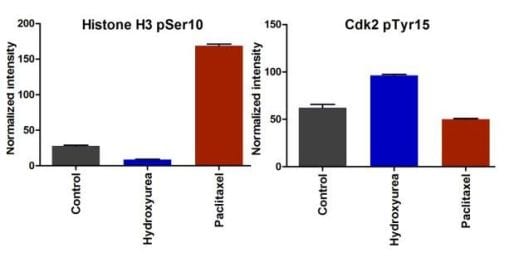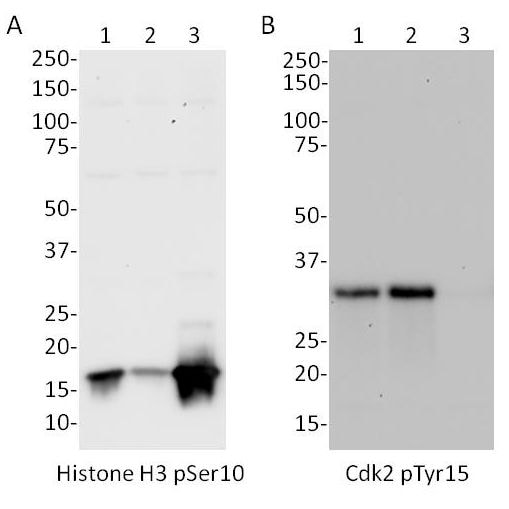Human Cell Cycle In-Cell ELISA kit (IR) (ab139412)
Key features and details
- Assay type: Cell-based (quantitative)
- Detection method: Colorimetric
- Sample type: Adherent cells, Suspension cells
- Reacts with: Mouse, Human
Overview
-
Product name
Human Cell Cycle In-Cell ELISA kit (IR) -
Detection method
Colorimetric -
Precision
Intra-assay Sample n Mean SD CV% Histone H3 3.9% Cdk2 4.4% -
Sample type
Adherent cells, Suspension cells -
Assay type
Cell-based (quantitative) -
Assay duration
Multiple steps standard assay -
Species reactivity
Reacts with: Mouse, Human -
Product overview
Human Cell Cycle In-Cell ELISA kit (IR) (ab139412) that uses quantitative immunocytochemistry to measure levels of Cdk2 protein phosphorylated Tyr15 and Histone H3 protein phosphorylated Ser10 levels in cultured cells. Cells are fixed in a microplate and targets of interest are detected with highly specific, well-characterized antibodies. Relative target levels are quantified using IRDye®-labeled Secondary Antibodies and IR imaging such as a LI-COR® Odyssey® or Aerius® system. Antibody signal intensity can be normalized to the total cell amount using Janus Green stain.
Plates are available in our ICE (In-Cell ELISA) Support Pack (ab111542) which can be bought seperately.
-
Notes
The Cdk2 (pTyr15) + Histone H3 (pSer10) In-Cell ELISA Kit (IR) (ab139412) is designed to study cell cycle effects in response to various stimuli. Monoclonal antibodies specific to Cdk2 (pTyr15) and Histone H3 (pSer10) are used in this high-throughput duplexing plate-based assay. Cdk2 (pTyr15) is elevated in G1/S phase of the cell cycle and Histone H3 (pSer10) is elevated in G2/M phase. Cyclin-dependent kinase 2 (Cdk2) is a nuclear protein kinase that functions in the G1/S phase of the cell cycle. Inhibitory phosphorylation occurs on residues Thr14 and Tyr15; activation of Cdk2 includes dephosphorylation of these residues by cdc25. Cdk2 can form a complex with Cyclin A, D or E. Phosphorylation of Cdk2 at Tyr15 indicates that a cell is at the G1/S transition.
Histone H3 is one of the four core histone proteins (H2A, H2B, H3 and H4) that pack DNA in nucleosomes. Post-translational modifications of histones include phosphorylation and acetylation and are important for chromatin assembly and gene expression. Phosphorylation of Histone H3 at Ser10 is tightly correlated with chromosome condensation during mitosis. Hence, Histone H3 pSer10 signal indicates a mitotic cell with condensed DNA.
In-Cell ELISA (ICE) technology employed to perform quantitative immunocytochemistry of cultured cells with a near-infrared fluorescent dye-labeled detector antibody. The technique generates quantitative data with specificity similar to western blotting, but with much greater quantitative precision and higher throughput due to the greater dynamic range and linearity of direct fluorescence detection and the ability to run 96 samples in parallel. Because the Cdk2 (pTyr15) antibody is a rabbit antibody and the Histone H3 (pSer10) antibody is a mouse antibody, they can be measured simultaneously in the same well using the cocktail of provided primary antibodies and the provided cocktail of IRDye®-labeled species-specific secondary antibodies when using a LI-COR infrared imager. This method rapidly fixes the cells in situ, stabilizing the in vivo levels of proteins and their post-translational modifications, and thus eliminating changes during sample handling, such as in the preparation of protein extracts. Finally, the Cdk2 (pTyr15) and Histone H3 (pSer10) signals can be normalized to cell amount, measured by the provided Janus Green whole cell stain, to further increase the assay precision.
Abcam has not and does not intend to apply for the REACH Authorisation of customers’ uses of products that contain European Authorisation list (Annex XIV) substances.
It is the responsibility of our customers to check the necessity of application of REACH Authorisation, and any other relevant authorisations, for their intended uses. -
Platform
Microplate
Properties
-
Storage instructions
Store at +4°C. Please refer to protocols. -
Components 1 x 96 tests 1000X IRDye-labeled Secondary Antibodies 1 x 24µl 100X Anti- Histone H3 (pSer10) Primary Antibody 1 x 120µl 100X Anti-Cdk2 (pTyr15) Primary Antibody 1 x 120µl 100X Triton X-100 1 x 500µl 10X Blocking Solution 1 x 10ml 10X Phosphate Buffered Saline 1 x 100ml 400X Tween-20 1 x 2ml 1X Janus Green Stain 1 x 17ml -
Research areas
-
Relevance
CdK2 is a member of the Ser/Thr protein kinase family. This protein kinase is highly similar to the gene products of S. cerevisiae cdc28, and S. pombe cdc2. It is a catalytic subunit of the cyclin-dependent protein kinase complex, whose activity is restricted to the G1-S phase, and essential for cell cycle G1/S phase transition. This protein associates with and regulated by the regulatory subunits of the complex including cyclin A or E, CDK inhibitor p21Cip1 (CDKN1A) and p27Kip1 (CDKN1B). Its activity is also regulated by its protein phosphorylation. Two alternatively spliced variants and multiple transcription initiation sites of this gene have been reported. -
Cellular localization
Cytoplasmic and Nuclear -
Alternative names
- Cdc2 related protein kinase
- Cell devision kinase 2
- Cell division protein kinase 2
see all -
Database links
- Entrez Gene: 1017 Human
- Entrez Gene: 8290 Human
- Entrez Gene: 12566 Mouse
- Omim: 116953 Human
- Omim: 602820 Human
- SwissProt: P24941 Human
- SwissProt: Q16695 Human
- SwissProt: P97377 Mouse
Images
-
HeLa cells were treated for 24h with varying concentrations of paclitaxel (0.26 – 2000 µM). Histone H3 pSer10 (red) intensity increases with increasing paclitaxel whereas Cdk2 pTyr15 (green) intensity decreases. This is the expected result for paclitaxel treatment: mitotic arrest. (B) HeLa cells were treated for 24h with varying concentrations of hydroxyurea (0.002 – 5 mM). Histone H3 pSer10 (red) intensity decreases with increasing paclitaxel whereas Cdk2 pTyr15 (green) intensity increases. This is the expected result for hydroxyurea treatment: G1/S-phase arrest.
-
Quantification of the data shown in Image 1. Data shown is for 24 hour treatment with 1 mM hydroxyurea, 333 nM paclitaxel and untreated (Control).
-
Cdk2 pTyr15 intensity increases with Hydroxyurea treatment dose whereas Histone H3 pSer10 intensity decreases.
-
Whole cell lysates from HeLa cells were analyzed by western blot with the primary antibodies used in this assay kit. (A) Histone H3 pSer10 antibody: untreated (lane 1), hydroxyurea = G1/S arrest (lane 2), paclitaxel = G2/M arrest (lane 3). (B) Cdk2 pTyr15 antibody: untreated (lane 1), thymidine = G1/S arrest (lane 2), nocodazole = G2/M arrest (lane 3).
Datasheets and documents
-
SDS download
-
Datasheet download
References (2)
ab139412 has been referenced in 2 publications.
- Tao ZS et al. Parathyroid hormone (1-34) can reverse the negative effect of valproic acid on the osseointegration of titanium rods in ovariectomized rats. J Orthop Translat 27:67-76 (2021). PubMed: 33437639
- Tao ZS et al. Co-modification of calcium phosphate cement to achieve rapid bone regeneration in osteoporotic femoral condyle defect with lithium and aspirin. Am J Transl Res 13:952-966 (2021). PubMed: 33841632






